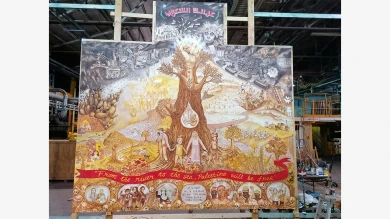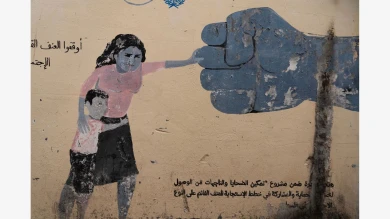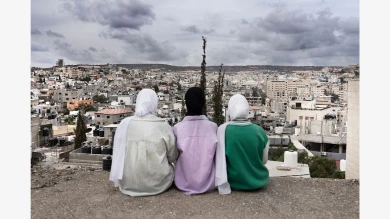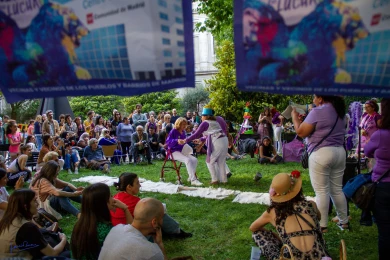Narratives from Palestine
Screening and Discussion with the Artists Shuruq Harb and Lara Salous
![Shuruq Harb. The Jump [El salto], Palestina, 2021. Cortesía de la artista](https://recursos.museoreinasofia.es/styles/large_landscape/public/Actividades/narrativas_desde_palestina._una_poetica_del_territorio_0.jpg.webp)
Held on 24 Jun 2024
This encounter welcomes screenings of films by Shuruq Harb (Ramallah, 1980), Shereen Abdel-Karim Hassanein (Gaza City, 1996) and Lara Salous (Ramallah, 1988), three Palestinian multidisciplinary artists that are part of the Tadafuq project, which provides artistic training and mentoring online for Palestinian creatives from the Gaza Strip, the West Bank and Jerusalem. The initiative has been developed by artist and curator Nicolás Combarro since 2020.
Alongside the film screenings is a conversation between Harb and Salous, accompanied by Sara Buraya Boned (Museo Reina Sofía), as they reflect on their experience as Palestinian women artists from a feminist perspective, exploring the possibilities of disseminating the Palestinian cause through their art-making, work which is punctuated by their ideas, desires and personal hopes.
From these artists’ different gazes on the living conditions in Palestinian regions sprout narratives around questions of identity, violence, memory and mental health to put forward new poetics about territories that form an alternative to the patriarchal and warmongering geopolitical vision.
Organised by
Museo Reina Sofía and TEJA. Red de espacios culturales en apoyo a las situaciones de emergencia
Participants
Sara Buraya Boned is head of the Museo Reina Sofía’s Tentacular Museum area.
Shuruq Harb is an artist, educator, film-maker and writer from Ramallah, in the West Bank, where she is currently based. Focusing on digital audiovisual culture online, Harb looks for subversive routes to circulate images. She has participated in solo and collective shows at the Gwangju Biennale (South Korea, 2012), the New Museum (New York, 2014), the Asian Art Biennial (Taiwan, 2017) and the Busan Biennale (South Korea, 2024), among others. She is currently in Madrid participating in an artist’s residency at the Casa de Velázquez, inside the framework of the TEJA network’s residency programme, and has also been a mentor on the Tadafuq programme.
Shereen Abdel-Karim Hassanein is an architect and visual artist with a degree in Architecture from the Islamic University of Gaza (IUG). The beginnings of her artistic career were self-taught, and she also participated in the Tadafuq programme, under the mentorship of artist Shuruq Harb. She has participated in local exhibitions in the Gaza Strip, her work exploring the process to produce and represent space for the purposes of addressing social issues via architectural abstractions.
Lara Salous is an architect, interior designer and artist from Ramallah, in the West Bank, where she is currently based. She studied Architectural Engineering at Birzeit University (Ramallah) and holds an MA in Interior Design from the University of Westminster (London). She participates in the Tadafuq programme, with her work rooted in traditional Palestinian handicrafts, particularly the use of wool and its applications in contemporary design. Thus, Salous traces the relationships between natural resources and the past and present of Palestinian culture and heritage.
Credits
Shuruq Harb. The Jump
Palestine, 2021, colour, original version with Spanish subtitles, DA, 10’
Shereen Abdel-Karim Hassanein. The Face of the City
Palestine, 2023, colour, original version with Spanish subtitles, DA, 11’. Produced by Tadafuq
Lara Salous. Around our Hands
Palestine, 2023, colour, original version with Spanish subtitles, DA, 7’
Más actividades

Institutional Decentralisation
Thursday, 21 May 2026 – 5:30pm
This series is organised by equipoMotor, a group of teenagers, young people and older people who have participated in the Museo Reina Sofía’s previous community education projects, and is structured around four themed blocks that pivot on the monstrous.
This fourth and final session centres on films that take the museum away from its axis and make it gaze from the edges. Pieces that work with that which is normally left out: peripheral territories, unpolished aesthetics, clumsy gestures full of intent. Instead of possessing an institutional lustre, here they are rough, precarious and strange in appearance, legitimate forms of making and showing culture. The idea is to think about what happens when central authority is displaced, when the ugly and the uncomfortable are not hidden, when they are recognised as part of the commons. Film that does not seek to be to one’s liking, but to open space and allow other ways of seeing and inhabiting the museum to enter stage.
![Tracey Rose, The Black Sun Black Star and Moon [La luna estrella negro y negro sol], 2014.](https://recursos.museoreinasofia.es/styles/small_landscape/public/Obra/AD07091_2.jpg.webp)
On Black Study: Towards a Black Poethics of Contamination
Monday 27, Tuesday 28 and Wednesday 29 of April, 2026 – 16:00 h
The seminar On Black Study: Towards a Black Poethics of Contamination proposes Black Study as a critical and methodological practice that has emerged in and against racial capitalism, colonial modernity and institutional capture. Framed through what the invited researcher and practitioner Ishy Pryce-Parchment terms a Black poethics of contamination, the seminar considers what it might mean to think Blackness (and therefore Black Study) as contagious, diffuse and spreadable matter. To do so, it enacts a constellation of diasporic methodologies and black aesthetic practices that harbor “contamination” -ideas that travel through texts, geographies, bodies and histories- as a method and as a condition.
If Blackness enters Western modernity from the position of the Middle Passage and its afterlives, it also names a condition from which alternative modes of being, knowing and relating are continually forged. From within this errant boundarylessness, Black creative-intellectual practice unfolds as what might be called a history of touches: transmissions, residues and socialities that unsettle the fantasy of pure or self-contained knowledge.
Situated within Black radical aesthetics, Black feminist theory and diasporic poetics, the seminar traces a genealogy of Black Study not as an object of analysis but as methodological propositions that continue to shape contemporary aesthetic and political life. Against mastery as the horizon of study, the group shifts attention from what we know to how we know. It foregrounds creative Black methodological practices—fahima ife’s anindex (via Fred Moten), Katherine McKittrick’s expansive use of the footnote, citation as relational and loving labour, the aesthetics of Black miscellanea, and Christina Sharpe’s practices of annotation—as procedures that disorganise dominant regimes of knowledge. In this sense, Black Study is approached not as a discrete academic field but as a feel for knowing and knowledge: a constellation of insurgent practices—reading, gathering, listening, annotating, refusing, world-making—that operate both within and beyond the university.
The study sessions propose to experiment with form in order to embrace how ‘black people have always used interdisciplinary methodologies to explain, explore, and story the world.’ Through engagements with thinkers and practitioners such as Katherine McKittrick, C.L.R. James, Sylvia Wynter, Christina Sharpe, Fred Moten, Tina Campt, Hilton Als, John Akomfrah, fahima ife and Dionne Brand, we ask: What might it mean to study together, incompletely and without recourse to individuation? How might aesthetic practice function as a poethical intervention in the ongoing work of what Sylvia Wynter calls the practice of doing humanness?

Intergenerationality
Thursday, 9 April 2026 – 5:30pm
This series is organised by equipoMotor, a group of teenagers, young people and older people who have participated in the Museo Reina Sofía’s previous community education projects, and is structured around four themed blocks that pivot on the monstrous.
The third session gazes at film as a place from which to dismantle the idea of one sole history and one sole time. From a decolonial and queer perspective, it explores films which break the straight line of past-present-future, which mix memories, slow progress and leave space for rhythms which customarily make no room for official accounts. Here the images open cracks through which bodies, voices and affects appear, disrupting archive and questioning who narrates, and from where and for whom. The proposal is at once simple and ambitious: use film to imagine other modes of remembering, belonging and projecting futures we have not yet been able to live.

Remedios Zafra
Thursday March 19, 2026 - 19:00 h
The José Luis Brea Chair, dedicated to reflecting on the image and the epistemology of visuality in contemporary culture, opens its program with an inaugural lecture by essayist and thinker Remedios Zafra.
“That the contemporary antifeminist upsurge is constructed as an anti-intellectual drive is no coincidence; the two feed into one another. To advance a reactionary discourse that defends inequality, it is necessary to challenge gender studies and gender-equality policies, but also to devalue the very foundations of knowledge in which these have been most intensely developed over recent decades—while also undermining their institutional support: universities, art and research centers, and academic culture.
Feminism has been deeply linked to the affirmation of the most committed humanist thought. Periods of enlightenment and moments of transition toward more just social forms—sustained by education—have been when feminist demands have emerged most strongly. Awareness and achievements in equality increase when education plays a leading social role; thus, devaluing intellectual work also contributes to harming feminism, and vice versa, insofar as the bond between knowledge and feminism is not only conceptual and historical, but also intimate and political.
Today, antifeminism is used globally as the symbolic adhesive of far-right movements, in parallel with the devaluation of forms of knowledge emerging from the university and from science—mistreated by hoaxes and disinformation on social networks and through the spectacularization of life mediated by screens. These are consequences bound up with the primacy of a scopic value that for some time has been denigrating thought and positioning what is most seen as what is most valuable within the normalized mediation of technology. This inertia coexists with techno-libertarian proclamations that reactivate a patriarchy that uses the resentment of many men as a seductive and cohesive force to preserve and inflame privileges in the new world as techno-scenario.
This lecture will address this epochal context, delving into the synchronicity of these upsurges through an additional parallel between forms of patriarchal domination and techno-labor domination. A parallel in which feminism and intellectual work are both being harmed, while also sending signals that in both lie emancipatory responses to today’s reactionary turns and the neutralization of critique. This consonance would also speak to how the perverse patriarchal basis that turns women into sustainers of their own subordination finds its equivalent in the encouraged self-exploitation of cultural workers; in the legitimation of affective capital and symbolic capital as sufficient forms of payment; in the blurring of boundaries between life and work and in domestic isolation; or in the pressure to please and comply as an extended patriarchal form—today linked to the feigned enthusiasm of precarious workers, but also to technological adulation. In response to possible resistance and intellectual action, patriarchy has associated feminists with a future foretold as unhappy for them, equating “thought and consciousness” with unhappiness—where these have in fact been (and continue to be) levers of autonomy and emancipation.”
— Remedios Zafra

27th Contemporary Art Conservation Conference
Wednesday, 4, and Thursday, 5 March 2026
The 27th Contemporary Art Conservation Conference, organised by the Museo Reina Sofía’s Department of Conservation and Restoration, with the sponsorship of the Mapfre Foundation, is held on 4 and 5 March 2026. This international encounter sets out to share and debate experience and research, open new channels of study and reflect on conservation and the professional practice of restorers.
This edition will be held with in-person and online attendance formats, occurring simultaneously, via twenty-minute interventions followed by a five-minute Q&A.



![Basel Abbas y Ruanne Abou-Rahme, At Those Terrifying Frontiers Where the Existence and Disappearance of People Fade Into Each Other [En esas fronteras aterradoras donde la existencia y la desaparición de personas se disuelven entre sí], 2019. Museo Reina](https://recursos.museoreinasofia.es/styles/small_landscape/public/Actividades/palestina_1.jpg.webp)
